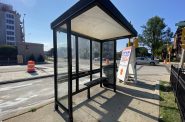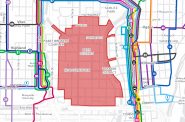80’s Law Led to the Rise of Big-box Stores
All the city news you can use.
![Walmart. Photo by Stu pendousmat at English Wikipedia [CC BY-SA 3.0 (http://creativecommons.org/licenses/by-sa/3.0) or GFDL (http://www.gnu.org/copyleft/fdl.html)], via Wikimedia Commons.](https://urbanmilwaukee.com/wp-content/uploads/2017/04/1024px-WalmartMoncton.jpg)
Walmart. Photo by Stu pendousmat at English Wikipedia (CC BY-SA 3.0) or (GFDL), via Wikimedia Commons.
The 1980 law that led to big box stores: The Motor Carrier Act of 1980, passed by President Jimmy Carter, slashed the cost of moving goods by truck, reducing the pay of millions of truck drivers by 50% and essentially created big-box retail. The law deregulated the trucking industry in hope to get rid of red tape and force competition, thus reducing good prices that big box and online retailers thrive on. But ultimately it has led to lower wages for truck drivers and a consolidation of retail competition. (Rachel Premak | Business Insider)
Where will America’s remote workers live? If workers are no longer attached to cities and urban centers following an increased business leanience for remote work and teleworking, where will they opt to live? Since it is possible for some to work from anywhere now, where will people stay if they can live anywhere? Proximity to family and personal finances is likely dominate the decision. Other determinants are climate, reliable internet, open space and more. (Bonnie Kristian | The Week)
Changing the narrative around housing: Research suggests that supporting housing justice policies is imperative in combating the housing crisis. But to look deeper into how housing justice could be advanced nationwide, several groups dove into housing narratives and framing that resonated with people. What they found was that values resonate more than problems and policy solutions; for example the idea of ‘affordability’ frames housing as a commodity while housing as a human need resonates with people on a more human level. (Miriam Axel-Lute | Shelterforce)
Dutch city changes green footprint for climate adaption strategy: To combat the effects of climate change, the Dutch city of Arnhem has put together a 10 year plan that will remake the city in order to respond to more extreme weather events like intense rainfall and heat. Adaptive measures include replacing 10% of the asphalt in the city with grass for heat control and rainwater retention, building more shade in shopping districts, and planting trees to create “cooling down” spots. (Daniel Boffey | The Guardian)
Quote of the Week
Everybody’s for equity, until they’re against it. Everybody’s for fairness, until they find out everybody won’t get what they want.
-Harris County TX commissioner Rodney Ellis discussing the implementation of an equity metric on how flood control money is spent in Houston in the New York Times.
This week on the podcast, University of Michigan assistant professor Rob Goodspeed joins us to talk about Scenario Planning for Cities and Regions.
Want more links to read? Visit The Overhead Wire and signup. (http://dtrnsfr.us/2iA8Yas)
Transportation
-
MCTS Adds 28 New Buses
 Jul 13th, 2024 by Graham Kilmer
Jul 13th, 2024 by Graham Kilmer
-
MCTS Designing New Bus Shelters
 Jul 10th, 2024 by Graham Kilmer
Jul 10th, 2024 by Graham Kilmer
-
MCTS Updates RNC Bus Detours To Better Serve Downtown, Riders
 Jul 9th, 2024 by Jeramey Jannene
Jul 9th, 2024 by Jeramey Jannene
Urban Reads
-
How Traffic Noise Impacts Children’s Brains
 Jul 1st, 2024 by Jeff Wood
Jul 1st, 2024 by Jeff Wood
-
Number of Super Commuters is Rising
 Jun 22nd, 2024 by Jeff Wood
Jun 22nd, 2024 by Jeff Wood
-
Why Has the Walkable City Been Villainized?
 Jun 9th, 2024 by Jeff Wood
Jun 9th, 2024 by Jeff Wood





















